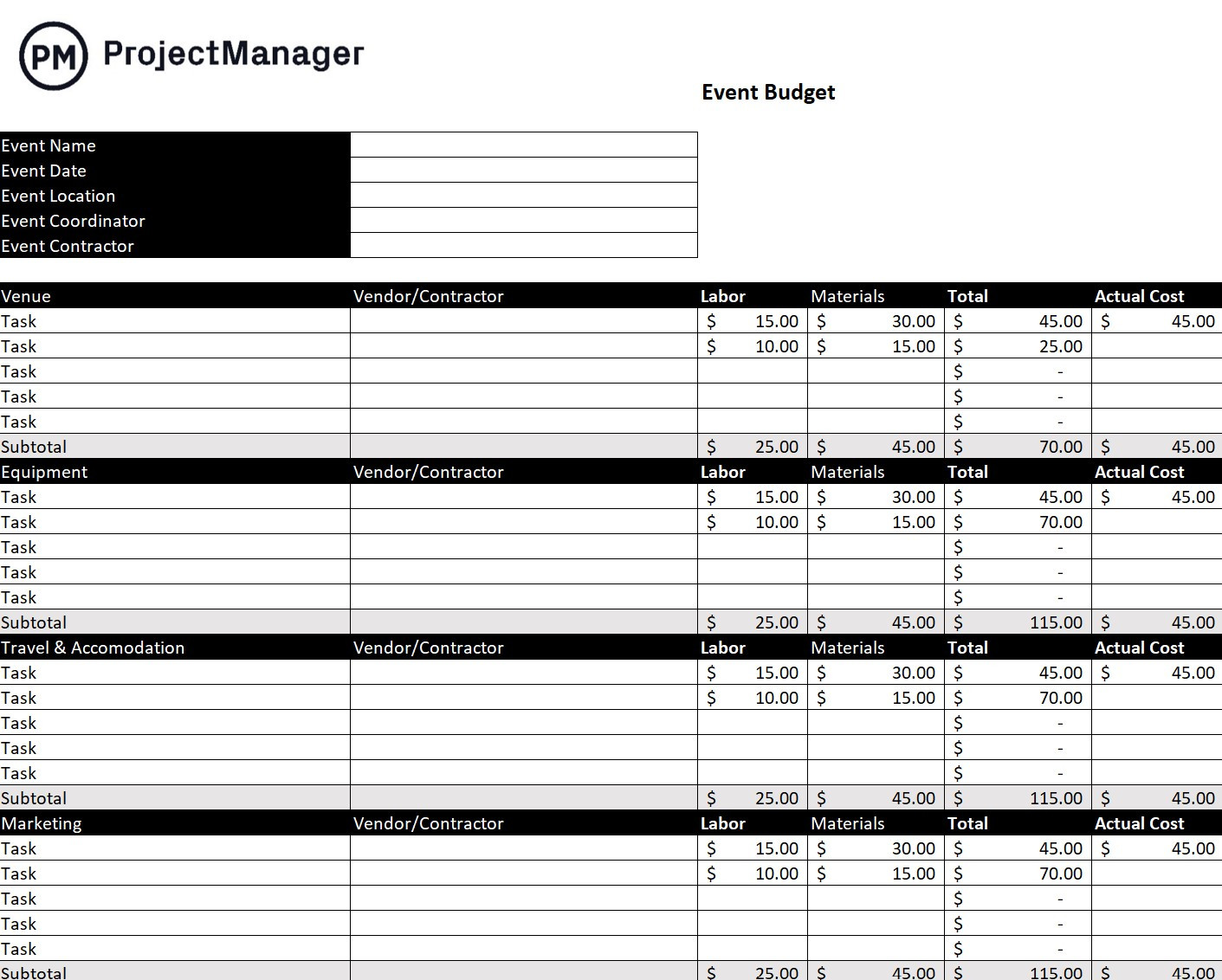Events Budget Template: A Comprehensive Guide
Planning an event can be a daunting task, especially when it comes to managing finances. Keeping track of expenses, revenues, and overall budget can be overwhelming without a clear plan in place. This is where an events budget template can be a lifesaver. By using a pre-designed template, event planners can effectively organize and monitor their finances, ensuring that the event stays within budget and is a success. In this guide, we will explore the purpose of an events budget template, why it is essential, how to use one effectively, and provide tips for successful budget management.
What is an Events Budget Template?

Image Source: template.net
An events budget template is a pre-formatted spreadsheet or document that helps event planners track and manage their finances. It typically includes sections for expenses, revenues, projected costs, actual costs, and any other financial details relevant to the event. The template serves as a roadmap for budgeting, allowing planners to allocate funds appropriately and make informed decisions throughout the planning process.
The Purpose of an Events Budget Template
The main purpose of an events budget template is to provide a structured framework for managing finances during the event planning process. By outlining all potential expenses and revenues in one document, planners can easily track their financial progress, identify any budgetary issues early on, and make necessary adjustments to stay within budget. Additionally, the template helps in communicating financial information with stakeholders, clients, and vendors, ensuring transparency and accountability throughout the planning process.
Why Use an Events Budget Template?

Image Source: smartsheet.com
Using an events budget template offers several benefits for event planners. Firstly, it provides a clear overview of the event’s financial landscape, helping to avoid overspending and stay within budget. Secondly, the template serves as a planning tool, enabling planners to make informed decisions about where to allocate funds and prioritize expenses. Lastly, the template helps in tracking financial progress and identifying any discrepancies or unexpected costs that may arise during the planning process.
How to Use an Events Budget Template
When using an events budget template, it is essential to follow a few key steps to ensure effective budget management. Firstly, start by listing all potential expenses and revenues related to the event, including venue costs, catering, entertainment, marketing, and any other relevant items. Next, allocate funds to each expense category based on priority and projected costs. As the planning process progresses, update the template with actual costs and revenues to track financial progress accurately. Lastly, regularly review the budget to identify any discrepancies or areas where adjustments may be needed.
Tips for Successful Budget Management

Image Source: visual-paradigm.com
Effective budget management is crucial for the success of any event. Here are some tips to help event planners make the most of their events budget template:
1. Set Clear Financial Goals

Image Source: fliplet.com
Before starting the planning process, establish clear financial goals for the event. Determine the overall budget, expected revenues, and any financial constraints that need to be considered.
2. Prioritize Expenses

Image Source: smartsheet.com
Allocate funds to expenses based on priority and importance to the event. Focus on essential items first, such as venue and catering, before allocating funds to secondary expenses.
3. Monitor Expenses Closely

Image Source: gdoc.io
Regularly update the events budget template with actual costs to monitor financial progress closely. Identify any discrepancies early on and make necessary adjustments to stay within budget.
4. Communicate with Stakeholders

Image Source: whova.com
Keep stakeholders, clients, and vendors informed about the event’s financial status. Communicate any budget changes or updates to ensure transparency and accountability throughout the planning process.
5. Plan for Contingencies

Image Source: projectmanager.com
Include a contingency fund in the budget to account for any unexpected costs or emergencies that may arise during the planning process. Having a buffer can help mitigate financial risks and ensure a successful event.
6. Seek Sponsorship or Partnerships

Image Source: guidebook.com
Consider partnering with sponsors or vendors to offset some of the event costs. Sponsorship can help reduce expenses and increase revenues, allowing for a more significant impact on the event budget.
7. Review and Evaluate
After the event is over, review the budget and evaluate the financial performance. Identify any areas for improvement and learn from the experience to make future events even more successful.
8. Use Technology for Budgeting
Consider using budgeting software or apps to streamline the budgeting process and make it easier to track and manage finances. Technology can help automate tasks, reduce errors, and provide real-time financial insights for better decision-making.
Conclusion
In conclusion, an events budget template is an essential tool for effective budget management during event planning. By using a structured template, event planners can stay organized, track finances accurately, and make informed decisions to ensure the success of their events. By following the tips provided in this guide, planners can maximize the benefits of their budget template and create memorable and successful events within budget.